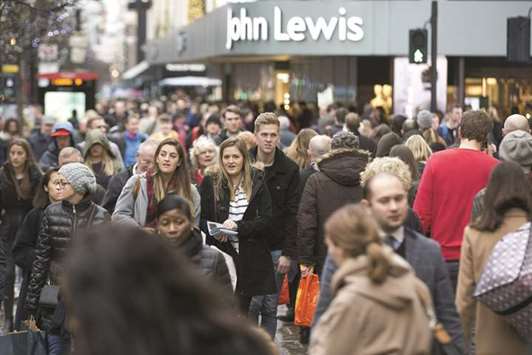British consumers, the main drivers of the economy, are their least confident since just after last year’s Brexit vote, and business morale has also softened, surveys showed yesterday, adding to signs of a further economic slowdown in 2018.
Separate data showed British house price growth, which has weakened since last year’s referendum decision to leave the European Union, was slower than expected in November.
The GfK consumer confidence index dropped by 2 points to -12 in November, its lowest since July 2016 and below the average forecast of a decline to -11 in a Reuters poll. “Sadly there’s no festive cheer,” said Joe Staton, an executive at the market research company. ”Household jitters following the recent interest rate hike, squeezed incomes, higher inflation and economic uncertainty have dampened the consumer mood across the UK.”
Britain’s economy has slowed this year as higher inflation — largely due to the fall in the pound after the Brexit vote last year — pushed up costs for households and businesses.
At the start of the month, the Bank of England raised interest rates for the first time in over a decade to tackle inflation that is at a five-year high, and last week government forecasters slashed their growth outlook.
GfK said households’ willingness to make big purchases fell to its lowest level since October 2014 in bad news for retailers in the run-up to Christmas. A separate survey by Lloyds Bank showed business confidence slipped this month — with economic optimism the lowest since June 2016.
“Firms are confident about their future, although the fall in economic optimism is an indication of economic and political uncertainties ahead,” said Hann-Ju Ho, senior economist at Lloyds Commercial Banking. British Prime Minister Theresa May hopes to move Brexit talks on to trade after a meeting with EU leaders next month.
But she first needs to make progress on Britain’s outstanding bills, the rights of EU citizens in Britain, and future border arrangements between the United Kingdom and the Irish Republic.
British media have reported that May was ready to pay around €50bn ($59bn) to leave the EU.
The British Chambers of Commerce said yesterday that exporters were benefiting from a weaker pound and stronger demand from the faster-growing eurozone economy.The volume of trade documentation — a leading indicator for export volumes — was 4% higher than a year earlier and its third highest since records began in 2004.
But some exporters were suffering from higher raw materials costs or staff shortages.
“Taken together with higher domestic costs... a tipping point may soon be reached for some firms — with consequences for investment, recruitment and trade,” BCC director-general Adam Marshall said.
Also yesterday, data from mortgage lender Nationwide showed the housing market — which is a big factor for consumer confidence — remained weak in November.
Prices rose 2.5% from November 2016, unchanged from the pace of growth in October and below a forecast for growth of 2.7% in a Reuters poll of analysts.
Samuel Tombs, an economist with Pantheon Macroeconomics, said mortgage interest rates had picked up in October ahead of the BoE’s rate hike, and several indicators were already pointing to a further slowdown in the market.
House prices were rising by about 5% in annual terms shortly before the Brexit vote in June 2016, according to Nationwide’s measure.

Pedestrians walk past a store on Oxford Street in London. The GfK consumer confidence index for the UK dropped by 2 points to -12 in November, its lowest since July 2016 and below the average forecast of a decline to -11 in a Reuters poll.
